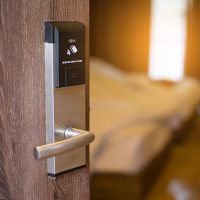Is It Premises Liability If Someone Has A Medical Emergency In A Hotel Room?

Premises liability laws hold business owners responsible for preventable accidents that injure customers on the premises, but to what extent does this apply to hotel guests? Supermarket managers can reasonably expect employees to inspect each aisle and clean up spills, and retail stores position security cameras to monitor areas open to the public, but it is neither appropriate nor legal for hotels to keep guests under constant surveillance while they are in their rooms. Hotel guests are entitled to the same privacy in their rooms as tenants are in their apartments. Yes, it is premises liability if a towel rack falls on a guest and causes injury as soon as the guest tries to remove the towel. If guests suffer health complications from pre-existing conditions, though, this is not usually the hotel’s responsibility; hotels do not and should not take a detailed medical history of every guest. If hotel employees suspect that guests are using illicit drugs in the rooms, they should call the police, but not every adverse reaction to a medication is the hotel’s responsibility. It is usually not premises liability if a guest’s health goes from bad to worse during a hotel stay, but the details of the individual case make all the difference. To find out more about premises liability and hotels, contact a Columbia premises liability lawyer.
Special Olympics Athlete Dies From Suspected Medication Error
The Special Olympics is an athletic competition for people with disabilities. In 2023, Steven Horvath traveled to Myrtle Beach to compete in a golf event at the Special Olympics. Horvath had developmental disabilities, and his family’s lawyer described him as having the “emotional and intellectual capacity of a child.” His family did not accompany him on the trip, but his doctors gave the event organizers detailed instructions about the prescription medications he took each day.
After arriving in Myrtle Beach, he checked into his hotel room, which he shared with two other teammates. He attended a group dinner and the opening ceremonies, and then returned to his room. In the morning, his teammates found him unresponsive, and he was pronounced dead at a hospital later that day. He was 37 years old.
Horvath’s family believes that Horvath died because of a medication error; he took either too much or too little medication. His blood alcohol content at the time of death was 0.086 percent, just above the legal limit; alcohol intoxication could not have caused his death, but alcohol might have interacted with his prescriptions. His family named the hotel, the Special Olympics, and the city of Myrtle Beach as defendants for failing to supervise the administration of Horvath’s medications.
Let Us Help You Today
The personal injury lawyers at the Stanley Law Group can help you pursue a complaint related to a preventable health emergency at a hotel. Contact The Stanley Law Group in Columbia, South Carolina or call (803)799-4700 for a free initial consultation.
Sources:
encyclopedia.com/law/encyclopedias-almanacs-transcripts-and-maps/hotel-liability
wbtw.com/news/grand-strand/myrtle-beach/myrtle-beach-special-olympics-sued-over-death-of-athlete-in-grand-strand-hotel-room/

